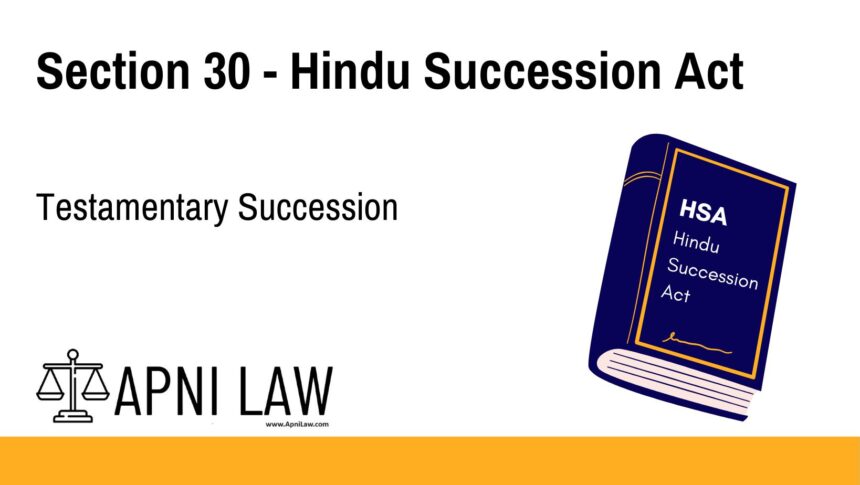Code: Section 30 – Hindu Succession Act, 1956
A Hindu may dispose of by will or other testamentary disposition any property, which is capable of being so disposed of by him, in accordance with the provisions of the Indian Succession Act, 1925 (39 of 1925), or any other law for the time being in force and applicable to Hindus.
Explanation of Section 30 – Testamentary Succession
Section 30 of the Hindu Succession Act, 1956 deals with testamentary succession. It grants a Hindu the legal right to dispose of their property by executing a will or any other testamentary instrument. This provision ensures that Hindus are not restricted to only intestate succession (succession without a will) but can also plan the distribution of their assets after death.
Key Elements:
- ✅ Applies to both males and females who are Hindus.
- ✅ Property must be capable of being disposed of (self-acquired or devolved under a will).
- ✅ The will must comply with the provisions of the Indian Succession Act, 1925.
- ✅ It enables complete freedom in devolution of property via testamentary disposition.
In short, this section empowers a Hindu to distribute property according to their wishes, overriding the default rules of succession if they create a valid will.
Illustration
Example 1: Testamentary Disposition of Self-Acquired Property
Ravi, a Hindu male, owns self-acquired property. Before his death, he creates a valid will distributing his assets among his wife, daughter, and a charitable trust. Under Section 30, this testamentary disposition is valid and overrides intestate succession rules.
Example 2: No Will = Intestate Succession
Sita, a Hindu widow, passes away without making a will. In this case, her property will be inherited based on the rules under Sections 8–13 of the Hindu Succession Act (i.e., intestate succession).
Common Questions & Answers on Section 30
1. Who can make a will under Section 30?
Any Hindu of sound mind and legal age (18 years or above) can dispose of their property through a will.
2. Can ancestral property be willed away?
Generally, a Hindu cannot will away coparcenary (ancestral) property unless they have converted it into self-acquired property or their share is defined and partitioned.
3. Is registration of a will mandatory?
No, registration is not mandatory, but it is recommended for legal authenticity and to prevent future disputes.
4. Does Section 30 override the general rules of succession?
Yes. A valid will made under Section 30 will take precedence over intestate succession laws.
5. Which law governs the validity of a Hindu will?
The Indian Succession Act, 1925 governs the procedural and legal requirements of a valid will under Section 30.
Conclusion
Section 30 of the Hindu Succession Act provides Hindus the right to dictate how their property will be distributed after their death through a valid will. This ensures legal clarity and respects the autonomy of the individual. Testamentary succession offers flexibility and control, making estate planning a vital part of one’s life decisions.
For expert legal insights, visit ApniLaw today!








